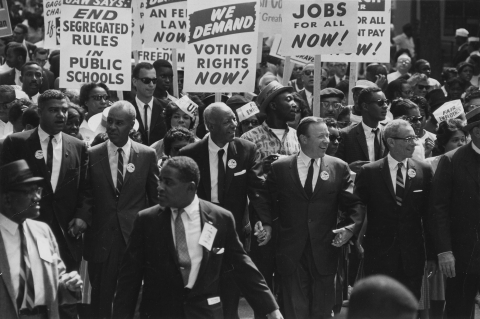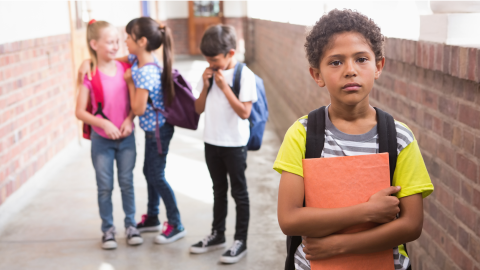Explore our curated collection pages of educational resources organized by themes and topics. Each collection includes lesson plans, teaching strategies, children's literature, blogs, family tools and other resources.

Address and Challenge Antisemitism
The topic of antisemitism is complex and deeply historical. Use these resources in the classroom and at home to help young people understand and challenge antisemitism.

Challenging Anti-Asian Bias and Acting as an Ally
Amid the increase in anti-Asian rhetoric, bullying in schools, racist incidents, scapegoating and hate crimes, use this collection of resources on anti-Asian bias and how to act as an ally.

Civil Rights Movement
The Civil Rights Movement of the 1950’s and 1960’s came about out of the need and desire for equality and freedom for African Americans and other people of color. Use this context to learn and teach about the movement in schools, at home and beyond.

Jewish American Heritage
Commemorate the history of Jewish contributions to American culture, acknowledging the diverse achievement of the Jewish community in the U.S. Use this collection of resources for educators and families to help teach about and celebrate Jewish American heritage in schools, communities and at home.

Black History Month
Black History Month is an excellent time to explore the Black experience—including the history, culture and achievements of Black people, the injustice faced by them and how that injustice has been and continues to be confronted and overcome.

Ability, Disability and Ableism
Awareness of and empathy for people with disabilities often does not get the focus and attention it deserves. Explore with young people the experiences of people with disabilities, the bias and discrimination they face, and the struggle to continue fighting for their rights.

Native American Heritage
In schools and classrooms, Native American Heritage Month is good time to explore Native American history and culture as well as the injustices faced by them and how that injustice has been and continues to be confronted and overcome.

National Hispanic Heritage
National Hispanic Heritage Month, which began in 1968, is a time for people to celebrate the achievements, contributions, culture and history of Hispanic and Latino-Americans.

Refugees, Muslim People and Anti-Muslim Bigotry
Resources for educators and others to address the topics of Muslim people, anti-Muslim bigotry and refugees with young people.

No Name-Calling Week
During No Name-Calling Week sponsored by GLSEN (Gay, Lesbian and Straight Education Network), use our educational resources to help create inclusive learning environments and counter bias and bullying in the classrooms, schools and world.

Asian American Pacific Islander (AAPI) Heritage
Asian American Pacific Islander (AAPI) Heritage Month is a celebration of the culture, traditions and history of Asian American and Pacific Islander people in the United States. Use these resources to teach and commemorate this heritage in school, communities and at home.

Women's History
Women’s History Month is an excellent time to talk with students about gender stereotypes and bias, hail important women in history, discover more about women’s issues and their fight for equity, and analyze sexism and explore its causes and solutions.

The Power of Poetry
Poetry uses vivid and descriptive language, beautiful imagery, unique sounds and rhythms, and diverse voices. It can touch hearts and minds and motivate action and societal change. In this way, poetry is a useful way to talk and teach about identity, diversity, bias and social justice.

From "Little Rock Nine" to Today
Learn, discuss and teach about the brave efforts of the students, later known as the "Little Rock Nine," to gain equal access to education in the United States. These nine African-American students quietly slipped into Central High School through the side door with the assistance of the city’s police.

National Bullying Prevention Month
Here are some resources to help students be motivated and empowered to act as allies and help contribute to creating a positive “ally culture” at their schools.

Countering Extremism and Combating Stereotypes
Young people are exposed to news stories every day through media and overheard conversations among the adults in their lives. Use these resources to teach about extremism.

After Charlottesville
The 'Unite the Right' event in Charlottesville, VA in 2017 precipitated many public conversations about the state of white supremacy, racism, antisemitism, domestic extremism, free speech and other related topics. Use these resources for teachers and families to help you discuss these topics with young people.

LGBTQ Pride Month
Lesbian, Gay, Bisexual, Transgender and Queer Pride Month (LGBTQ Pride Month) is celebrated each year in the month of June to honor the 1969 Stonewall riots in New York City.

Immigration, Immigrants and Anti-Immigrant Bias
A collection of education resources for educators, parents and families on immigration, immigrants and anti-immigrant bias.

Sports and Social Justice
Throughout our nation’s history, athletes have taken stands on issues and made political statements, lent their names to causes they believe in and used their power and platform to speak truth to power. As a result, sports inspire teachable moments to talk with young people about identity, diversity, bias and social justice.

Teaching about Elections
Elections often bring about differences of opinion and strong feelings. Use this collection of resources in schools and at home to teach young people about civics, how government works, the electoral process and more.

Racism, Violence and the Criminal Justice System
Throughout the years, there have been incidents of police officers involved in the deaths of Black and Latin American people. In many of these cases, police officers were not indicted and not convicted when brought to trial. Use these resources to teach youth about racism, violence, inequity and the criminal justice system.

A Brief History of the Disability Rights Movement
It took centuries for people with disabilities to be given equal rights and legal protection. Learn about the disability rights movement of the 1960s and onwards.

Welcoming Week
“Welcoming Week” is a time to connect with diverse communities and reflect on the importance of inclusivity. Look more closely at the spaces and systems in your community and explore ways to make them more welcoming for everyone, including immigrants and refugees.

National Arab American Heritage Month
Commemorate Arab American history. Uses these resources to explore the rich history and culture of people who are Arab American as well as analyze the bias and discrimination faced by them.









